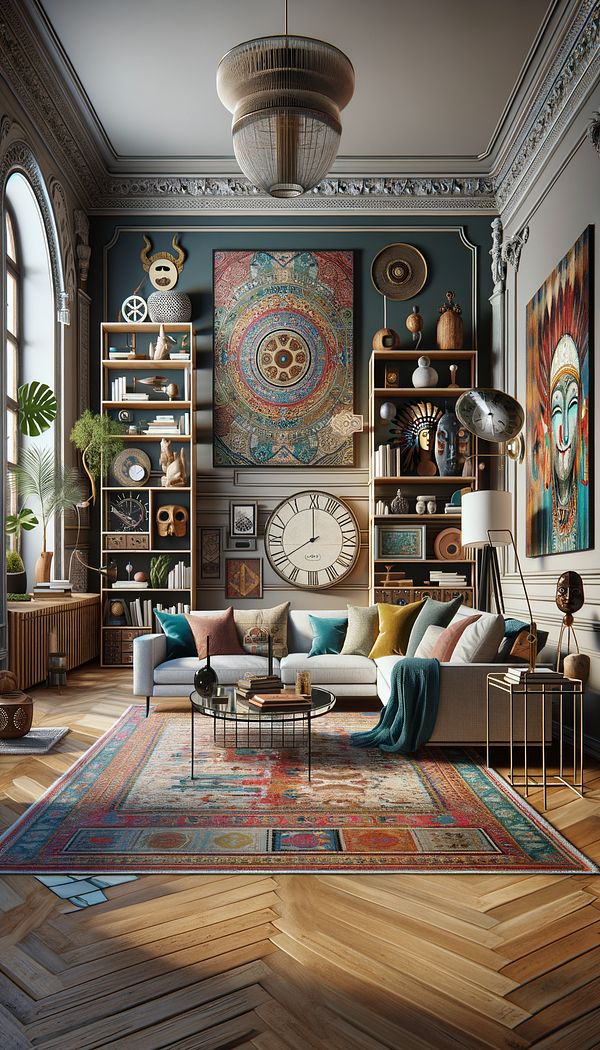What is Eclectic?
Eclectic refers to a design style that combines elements from various time periods, cultures, or design philosophies.
Description
Eclectic interior design is distinguished by its diversity and freedom of expression, allowing for a harmonious blend of contrasting styles, textures, and colors. This approach embraces the idea of mixing and matching different design elements to create a unique and personalized space. It's not confined to any strict rules, which encourages creativity and individuality in design arrangements.
The key to mastering eclectic design lies in achieving balance and coherence among the varied elements. It involves a thoughtful selection and placement of items, ensuring they complement each other despite their differences. The eclectic style celebrates the beauty of contrast, bringing together modern and vintage, luxury and simplicity, or bold and subtle elements in a cohesive manner.
To successfully implement an eclectic design, it's crucial to have a unifying element or theme that ties the disparate pieces together. This could be a consistent color scheme, texture, or pattern that runs throughout the space. With careful consideration and strategic planning, an eclectic interior can offer a dynamic and inviting atmosphere that reflects the personal tastes and experiences of its inhabitants.
Usage
An example of the eclectic approach in practice could be a living room that features a contemporary sofa, paired with antique wooden chairs, a modern art piece hanging above a traditional fireplace, and an array of global decorative accents. This blend of new and old, coupled with a variety of textures and colors, embodies the essence of eclectic design.
FAQs
-
How do I prevent my eclectic design from looking cluttered?
To avoid clutter, focus on balance and cohesion. Carefully select pieces that speak to you and ensure they have a connecting thread, like a color or material. Don't overdo it with too many items; remember, less is often more in achieving a cohesive look.
-
Can eclectic design incorporate elements from specific design styles?
Absolutely! Eclectic design thrives on the mix-and-match principle. You can combine elements from various design styles, such as Mid Century Modern, Industrial, or Bohemian, to create a personalized space that reflects your unique style.
-
Is there a difference between eclectic design and mismatched chaos?
Yes, there's a significant difference. Eclectic design is intentional and curated, with a harmonious blend of elements creating a cohesive space. Mismatched chaos lacks coherence and can feel disjointed and overwhelming. The secret to eclectic design is in the thoughtful selection and arrangement of diverse pieces.
Practical Application
Begin by identifying a unifying element for your space, such as a color palette or material theme. Mix textures, periods, and styles, but do so with intentionality. Keep balance and proportion in mind, and allow the room to tell a story through its diverse yet harmonious elements. Experimenting with different combinations can lead to wonderfully unexpected and personally meaningful interiors.
-
Design Styles478 articles
-
Furniture Types599 articles
-
Decorative Techniques322 articles
-
Decorative Objects240 articles
-
Color & Patterns154 articles
-
PolychromePolychrome refers to the practice of decorating architectural elements, sculptures, or artworks in a variety of colors.
-
AccessoriesAccessories in interior design refer to items used to enhance the aesthetic appeal and functionality of a space.
-
EbenisteAn ebeniste is a highly skilled cabinetmaker who specializes in the art of fine furniture making.
-
VintageVintage refers to items, especially furniture and decor, from a previous era that have a sense of history and timeless appeal.
-
Linen-PressA linen-press is a type of cabinet traditionally used for storing linens, such as sheets, tablecloths, and towels.
